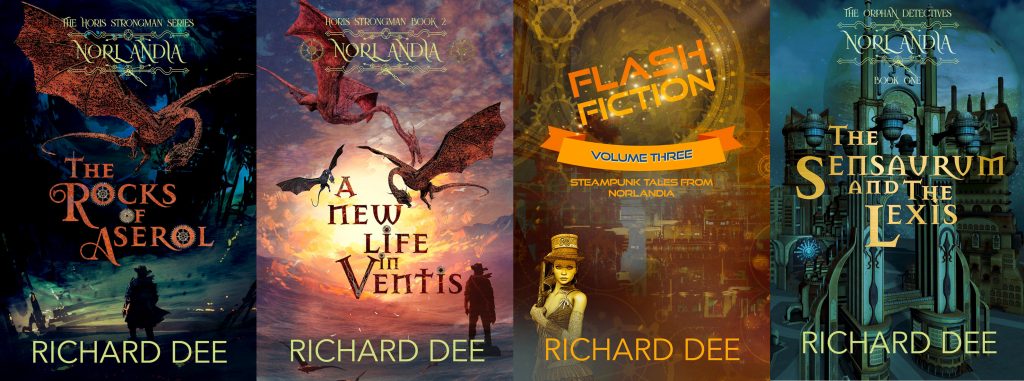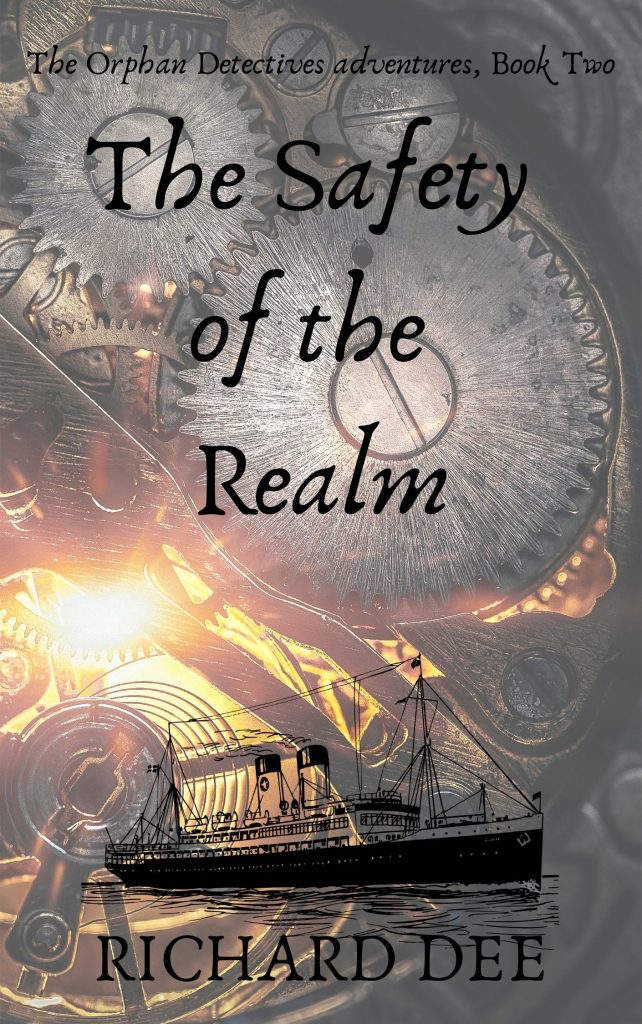There’s a challenge in making a new world. It has to be believable and relatable, whether it’s now or in the future.
Or even if it takes place in an alternative now, which is what my Steampunk world of Norlandia is.

Even though Norlandia is not a direct copy of a real place, it is modelled on a period from England’s past, that of the years around 1860. The technology is based on that of the time, with the advancement that a few intervening years might have brought.
The challenge in creating Norlandia is working out how to update a technology without using oil or electricity. What we’re really looking for is how it might have developed from their days. As ever, there is more than one way of doing most things, we tend to think that our way is the best, but having oil and electricity merely makes it easier to progress in a certain way.
Once you start to work out other ways of doing things, you find redundancy in what you have now, for example, compressed gas can be used instead of gunpowder, coiled springs store power in the same way as a battery does. Either method is equally valid, it’s just that one developed first. And, very often, the way we do things is no better than the alternative.
You can also assume that, as Norlandian science evolves in a different direction, new discoveries will be made and advances discovered in disciplines that we take little notice of or are only just starting to explore. In a very short time, the divergence can produce a radically different society, with different priorities.
With a lack of electricity or oil, the alternatives will be at a higher technical level, because they need to be. Norlandia has incredibly efficient clockwork motors and miniature coal or gas-fired engines. And there is no reason for them not to have jet engines, burning stored gas instead of vapourised liquid hydrocarbons.
Norlandia also has very advanced medical knowledge, with bio-mechanical clockwork artificial limbs and simple, steam-powered robotics doing a lot of the heavy work.
And with this difference in the world will naturally come a different attitude in its population. They don’t see things the same way as us, which gives you a lot more things to play with as you bring the narrative to life.
And how does all this tie into what I’ve been writing, I hear you ask?
The story I’m currently trying to finish, The Safety of the Realm, is my fourth Steampunk novel set in Norlandia. As well as them, I also have a set of sixteen short stories and Flash Fiction pieces that introduce you to the place and set up much of the world-building.
The great advantage of setting multiple books in the same world is that you can reuse a lot of the basics, to get the casual reader up to speed and provide a gentle reminder for the aficionado of what the place is all about. Not only that, by varying the content slightly as time passes, you can give the impression of a society that is not static but evolving.
As science advances the old concepts are replaced by new discoveries. So, in the first novel, The Rocks of Aserol, and its sequel, A New Life in Ventis, electricity was a novelty. In my short story, This could change the World, it becomes a practical application. Now, in the Orphan Detectives novels, it is beginning to gain familiarity as a useful part of society.
In this latest adventure, its potential will be taken further, with the inevitable consequences for the old ways of doing things. More new inventions also appear, which makes the world fluid, rather than a static place where nothing ever alters.
All that progress adds to the timeline, people in my later stories can look back and remember the past, little things like that help make the whole world feel more realistic.
Of course, progress can be hard for some people to adapt to, but that aspect also gives the narrative realism.
Already the heroes from the first books are historical figures, the subject of myth and conjecture, it all helps to make my fictional world become a living place.
Here’s a little more about the story that I’ve been working on.

Fresh from their recent adventures, Jackson and Jessamine are newly-wed and on holiday, aboard the luxury liner King Leopold.
Their destination, the fabled Western Isles, lands of mystery and scene of many a recent battle.
After what they have been through, it should be a time of rest and recuperation, of seeing the wonders of life in foreign parts.
They find that their voyage is filled with intrigue, everyone has a secret to hide. Life on the ocean wave is no life of leisure.
Then there is the visitor in foreign parts, with his devastating news.
They learn that their holiday is over, that they are needed to fight a new foe.
This threat is borne of a new way of waging war, against which Norlandia has no defence, unless the plans for the destruction of everything they hold dear are retrieved and delivered.
There will be no rest for the Orphan Detectives, until this threat is dispatched.
Incidentally, since the beginning of January, I’ve added over 21,000 words to the story.
I’m hoping to have a first draft ready soon.

I’d love to get your comments, please leave them below. While you’re here, why not take a look around? There are some freebies and lots more content, about me, my writing and everything else that I do. You can join my newsletter for a free novella and more news by clicking this link.

![]()



Stevie Turner
If only we had the advantage of future technology…
Richard Dee
That’s the great advantage of writing about an alternative world, you can repurpose all kinds of useful things.
Geoff
Do you keep a bible of how things work, to reference when you start a new story or are you able to pull a lot from memory? Or is that the joy of editing? Write the next story as best you can remember the last and then do the double checking to make sure you haven’t accidentally invented the telephone?!
Richard Dee
I’m fortunate to have a good memory, as well as a host of continuity checkers among the voices in my head. Even so, I have to read the old stories to remind myself. In doing that, I find things I don’t always remember writing.
Janet Gogerty
There is more to Steam Punk than I thought and you have made me think. Why do we assume there has only been one path of progress…
Richard Dee
Absolutely, once you start to diverge from how things are, a whole new world opens up.